
Top Alternatives to Alcohol: Enjoy the Buzz Without the Booze
Looking for alternatives to alcohol? Whether you need a break from booze or want a healthier social drink, there are plenty of options available. From botanical drinks to synthetic alternatives, this guide explores the best alcohol-free choices that can offer similar relaxing or social effects without the hangover.
Key Takeaways
- The demand for alcohol alternatives is growing, particularly among health-conscious consumers, with non-alcoholic beverage sales increasing by 32% in 2023.
- Synthetic alcohol alternatives aim to replicate alcohol’s calming effects while minimizing health risks, but face regulatory hurdles for market approval.
- Botanical and plant-based drinks are gaining popularity, offering social experiences similar to alcohol without the associated health risks, reflecting changing consumer preferences.
The Need for Alcohol Alternatives
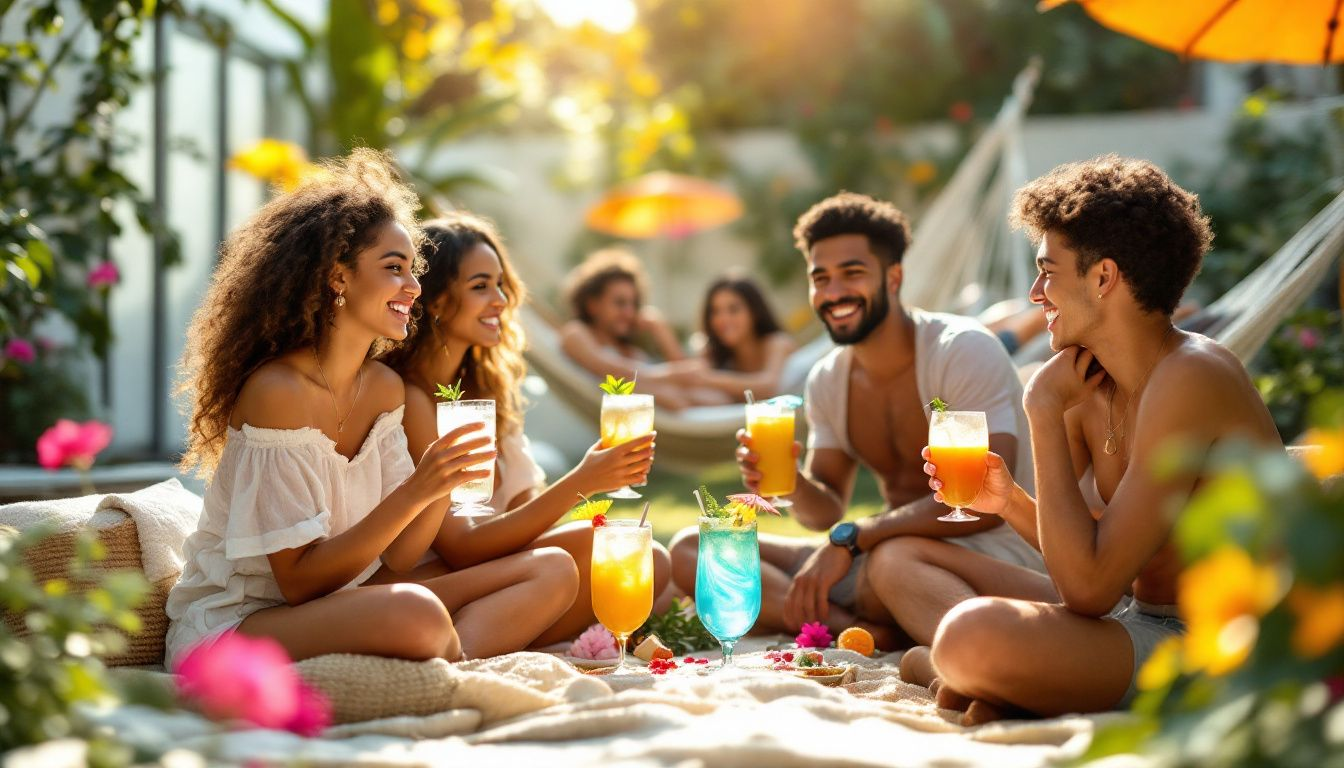
The trend towards alcohol alternatives is gaining momentum, particularly among younger, wealthier, and health-conscious consumers. Gen Z, in particular, is leading the charge, with many opting for mocktails and no-alcohol options over traditional alcoholic drinks. This shift is not just a passing fad; it’s a significant change in drinking habits driven by a desire for healthier living.
In 2023, sales of non-alcoholic beverages grew by an astonishing 32%, reflecting a broader societal shift towards alcohol-free and low-alcohol drinks.
Many individuals are motivated by the harmful effects associated with alcohol consumption, seeking out functional alcohol alternatives that offer a similar social experience without the negative health impacts.
This change is also fueled by the growing confidence people feel when choosing non-alcoholic drinks in social settings, with 57% reporting increased confidence.
The demand for alcohol alternatives is not just about avoiding the harmful effects of alcohol. Embracing a lifestyle that prioritizes wellness and mental clarity is another motivation. With the rise in alcohol use disorders and the recognized risks of excess alcohol intake, more and more people are looking for functional alternatives that allow them to enjoy social drinking without compromising their health.
Understanding Alcohol's Effects on the Brain
Understanding how alcohol affects the brain highlights the need for alternatives. Alcohol primarily targets the GABA neurotransmitter system, enhancing GABA activity to promote neuronal calming and relaxation.
This mechanism is at the heart of alcohol’s ability to reduce social anxiety and promote sociability, making it a popular choice for social drinking.
Alcohol also increases dopamine levels, which enhances feelings of pleasure and euphoria. These psychological effects make alcohol appealing, but they come with significant downsides, including the risk of alcohol use disorders and the negative impact on brain function over time.
The appeal of alcohol’s effects is undeniable, but the consequences of excess alcohol intake are well-documented and can be severe.
Functional alcohol alternatives aim to replicate these social and calming effects without the adverse health impacts. With the growing trend towards wellness and fitness, more people are participating in initiatives like Dry January and seeking out low or no-alcohol options.
The market for non-alcoholic spirits and other alcohol-free options is expanding, reflecting a shift towards more inclusive and health-conscious drinking habits.
Synthetic Alcohol Alternatives: A Safer Buzz?
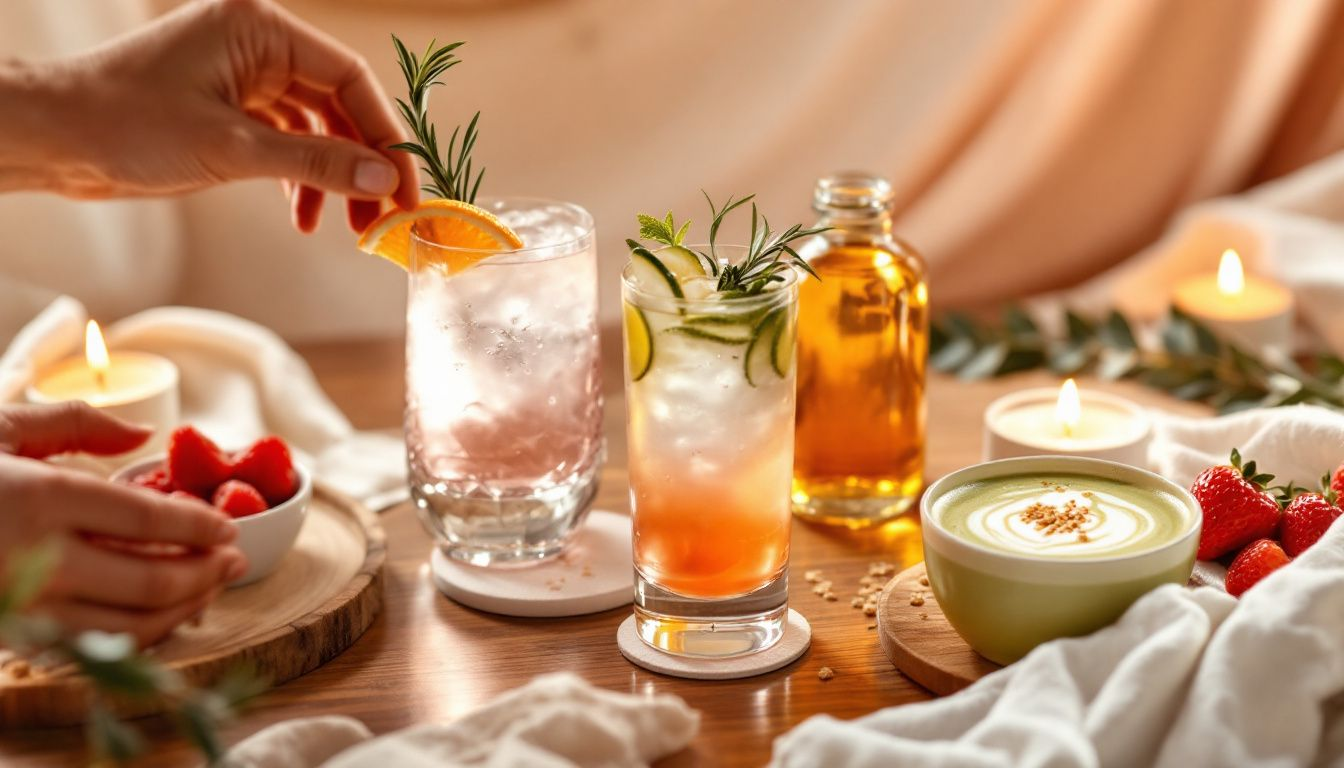
Synthetic alcohol alternatives are designed to offer the same relaxing and anxiety-relieving effects as alcohol but with a reduced risk of harm.
These functional alcohol alternatives target the GABA neurotransmitter system, similar to how alcohol works, but aim to minimize the negative health impacts. Synthetic compounds aim to replicate alcohol’s effects, potentially reducing alcohol-related harm.
Ongoing studies are evaluating the psychological, physiological, and biochemical impacts of these synthetic alternatives, exploring their potential to replace traditional alcoholic beverages.
The commercial potential for these compounds is significant, especially if they can effectively replicate the psychological effects of alcohol without the associated risks.
Leading Synthetic Compounds
One of the leading synthetic compounds is AZD7325, which selectively targets GABA receptors a2 and a3, aiming to replicate the effects of alcohol.
Research suggests that partial GABA receptor agonists, like AZD7325, can minimize the risk of excessive intoxication, providing a safer alternative to traditional alcohol.
These compounds are designed to produce relaxation and anxiety relief, similar to low doses of alcohol, without the harmful side effects.
Other synthetic compounds are also being developed and studied for their potential to affect GABA receptors and other neurotransmitters, offering a range of functional alcohol alternatives that cater to different preferences and needs.
The development of these compounds involves extensive research and testing to ensure their safety and efficacy.
Regulatory Challenges
While synthetic alcohol alternatives hold great promise, they face significant regulatory challenges. In the UK, rigorous food safety testing protocols are required for market approval of these alternatives.
Lead molecule testing for synthetic alcohol alternatives is currently underway and is expected to conclude in about a year.
The regulatory landscape varies significantly between the USA and the UK, creating additional hurdles for companies looking to market these products.
One of the primary challenges is the classification of synthetic alcohol alternatives, whether as food supplements or low-alcohol products, which impacts their marketing and distribution under UK food regulations.
Botanical and Plant-Based Drinks
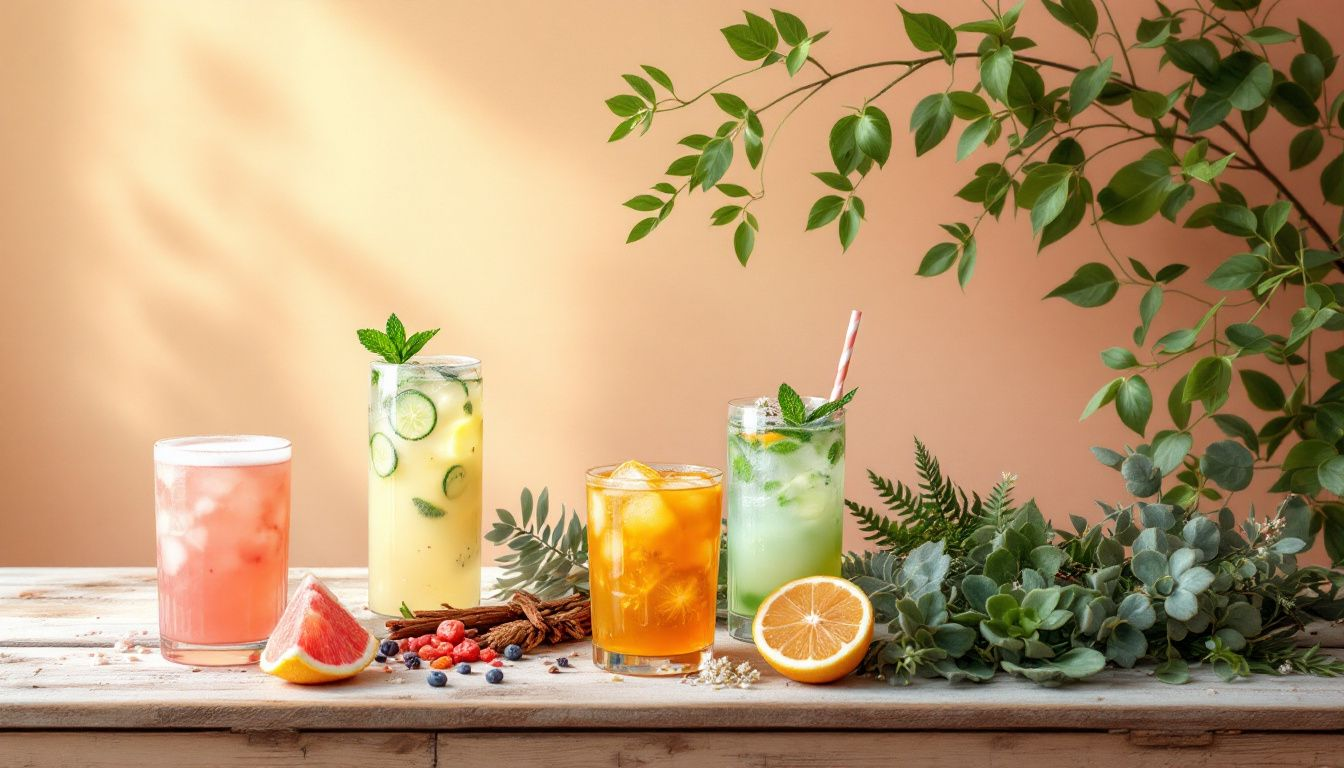
Botanical and plant-based drinks are emerging as popular alcohol alternatives, offering the social effects of alcohol without the associated risks.
These drinks often replicate the calming and sociable effects of alcohol using natural ingredients like plant extracts and herbs. The UK government Foresight report has envisioned the potential of these functional alcohol alternatives, highlighting their benefits.
Some of the plant extracts identified as potential alcohol alternatives include blackberry juice, magnolia, and liquorice.
These botanical drinks aim to enhance GABA receptor effects, providing a natural way to achieve the desired alcohol-like effects. However, the process of testing plants for GABA activity is slow and labor-intensive, requiring extensive data analysis.
Popular Botanical Options
Several botanical drinks have gained popularity for their unique flavors and potential health benefits. Blackberry juice, for instance, is known for its ability to enhance GABA receptor activity.
Sentia Red combines various herbs recognized for their beneficial properties and is marketed as a GABA spirit.
Other popular options include Feragaia, a botanical spirit with complex aromas recommended for mixing with citrus and seltzer, and Pentire Adrift, which combines herbal notes with bright citrus and is best served with ice and soda.
Seedlip Garden 108 offers a vegetal taste profile, often mixed with soda for an enhanced flavor experience.
These botanical drinks provide a satisfying alternative to traditional alcoholic beverages.
Consumer Acceptance and Market Trends
Consumer acceptance of botanical and plant-based drinks is on the rise, with many brands now offering non-alcoholic spirits that closely replicate the taste and experience of traditional liquors.
Sentia Red, for example, has received a consumer review rating of four out of five stars, indicating positive reception and satisfaction.
Market trends show a growing demand for these products as more consumers look for healthier alternatives to alcohol.
The rise of non-alcoholic spirits reflects a broader shift in consumer preferences towards functional alternatives that offer the desired social experience without the negative health impacts.
Adaptogenic Beverages: Stress Relief in a Glass
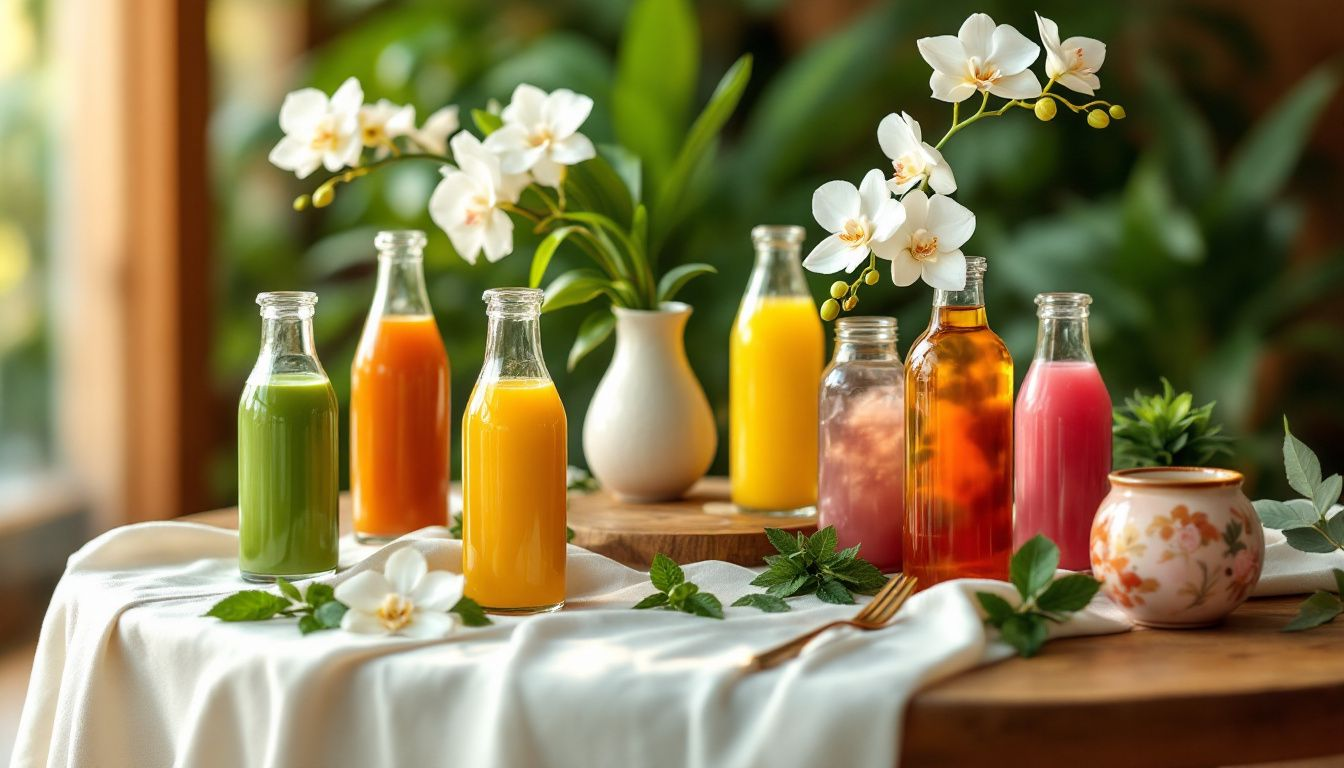
Adaptogenic beverages are another exciting category of alcohol alternatives, offering stress relief and enhanced mental alertness through various herbs and plants.
These functional drinks provide calming effects that can help individuals manage anxiety and stress, making them a popular choice for those looking to reduce their alcohol intake.
The efficacy of adaptogenic beverages in delivering health benefits is still under investigation, as many claims are not yet scientifically validated.
However, their potential to serve as functional alcohol alternatives is promising, offering a natural way to achieve relaxation and mental clarity.
Safety and Efficacy
While adaptogenic beverages offer potential benefits, they also carry safety concerns. These drinks are not FDA regulated, and there is a risk of negative interactions with medications.
Individuals adopting a low or no-alcohol lifestyle should seek advice from a primary care provider or nutrition specialist to ensure these beverages are safe for their specific needs.
Pregnant women should consult with their doctor before using adaptogenic beverages, and those concerned about weight gain should moderate their intake, as some options can be high in calories. Some consumers might experience negative side effects from adaptogens, such as headaches, due to the lack of proven benefits.
Non-Alcoholic Spirits and Cocktails
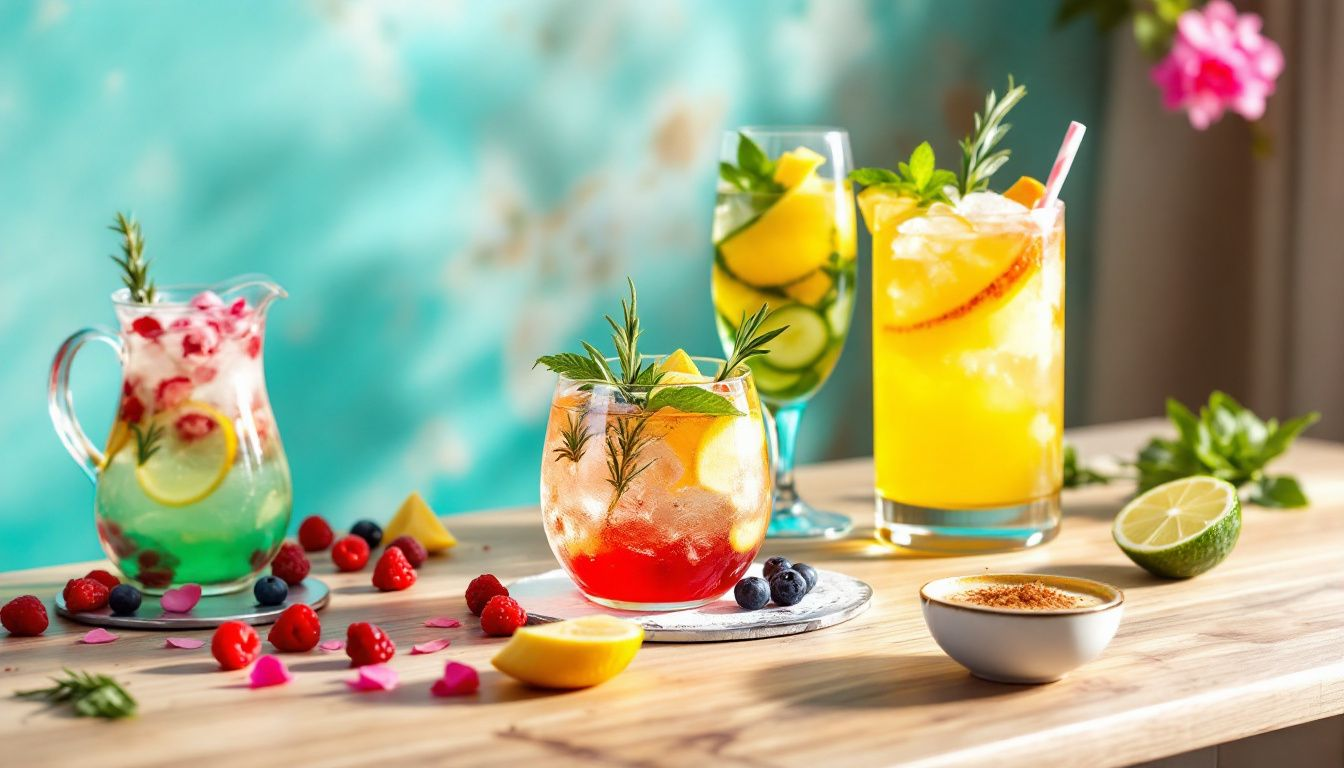
Non-alcoholic spirits and cocktails are now widely available, offering a way to enjoy social drinking without the effects of alcohol.
These products are designed to replace traditional liquors in cocktails, providing the same taste and experience without the alcohol.
Ritual Zero Proof, for example, offers non-alcoholic versions of traditional spirits, allowing consumers to enjoy their favorite cocktails without the negative health impacts. These non-alcoholic drinks cater to a growing demand for healthier social drinking options.
Popular Brands and Products
Ritual Zero Proof is a leading brand in the non-alcoholic spirits market, offering alternatives to traditional spirits like gin and whiskey. Sentia Red is another popular product, developed as a plant-based alcohol alternative, combining various herbs recognized for their beneficial properties.
These brands have gained consumer acceptance for their innovative offerings, providing functional alcohol alternatives that cater to different preferences and needs.
Benefits and Drawbacks
Non-alcoholic spirits offer several benefits, including being gluten-free and catering to dietary restrictions while providing social enjoyment. They allow individuals to partake in social drinking without the harmful effects of alcohol, reducing the risk of alcohol-related health issues.
However, there are also drawbacks to consider. Some non-alcoholic beverages may still contain trace amounts of alcohol, potentially triggering cravings for those in recovery. Weighing the benefits and drawbacks can help determine if these alternatives suit your lifestyle.
Implications for Public Health
The shift towards alcohol alternatives has significant implications for public health. The UK government Foresight report highlights the potential benefits of functional alcohol alternatives, including reduced alcohol-related harm and improved mental health outcomes. The market for alcohol-free functional beverages is rapidly expanding, reflecting a broader societal shift towards healthier drinking habits.
However, there are challenges to consider, such as the potential for non-alcoholic spirits to trigger cravings in individuals in recovery. Balancing the benefits of these alternatives with the risks is essential to reduce risk, especially for vulnerable populations.
Summary
In conclusion, the rise of alcohol alternatives reflects a growing desire for healthier lifestyles and wellness. From synthetic alcohol alternatives to botanical drinks and adaptogenic beverages, there are numerous options available for those looking to enjoy the social and psychological effects of alcohol without the associated risks. These alternatives offer a promising way to reduce alcohol-related harm and improve overall well-being.
As the market for these functional alcohol alternatives continues to expand, it’s essential to stay informed about their benefits and potential drawbacks. By making informed choices, individuals can enjoy the social aspects of drinking while prioritizing their health and wellness.
Frequently Asked Questions
What happens on day 4 of not drinking?
On day 4 of not drinking, many individuals start to feel relief from the most severe withdrawal symptoms, while others may experience the onset of more intense symptoms, including hallucinations and seizures. It's crucial to approach this period with careful monitoring and support.
Are synthetic alcohol alternatives safe to consume?
Synthetic alcohol alternatives may offer reduced harmful effects compared to traditional alcohol, but their safety can vary and requires rigorous testing for market approval. Always stay updated on research and regulatory developments regarding these products.
What are some popular botanical drinks?
Popular botanical drinks like Seedlip Garden 108, Feragaia, and Sentia Red provide unique flavors and health benefits through their use of herbs and plant extracts. Consider trying these options for a refreshing and natural beverage experience.
Can adaptogenic beverages help with stress relief?
Yes, adaptogenic beverages can help with stress relief by providing calming effects from various herbs and plants. However, it's advisable to consult a healthcare provider before use for optimal guidance.
What are the benefits of non-alcoholic spirits?
Non-alcoholic spirits provide a healthier option for social drinking, allowing individuals to enjoy the experience without the negative effects of alcohol. They also cater to dietary needs, such as being gluten-free, making them a versatile choice.


